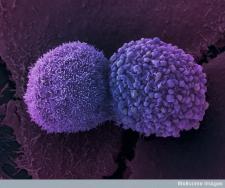Experimental Cancer Therapy Holds Great Promise — But at Great Cost
By Meghana Keshavan,
STAT
| 08. 23. 2016
Soon after she received the treatment, Karen Koehler’s brain swelled. Her blood pressure plummeted. As she fell into a coma, her husband and sister sat at her bedside — urging the doctors to keep pushing her farther along the razor’s edge between life and death.
Koehler was undergoing a promising — and terrifying — experimental therapy that her oncologists hoped could rid her body of cancer entirely. It’s called CAR-T therapy, and it works by engineering the patient’s own immune cells to attack cancer.
One of the hallmarks of CAR-T: It has to nearly kill you if it’s going to save you.
The treatment induces such sudden and severe side effects that it can take a small army of top specialists to keep patients alive while their newly engineered immune systems attack their cancer cells. The result: CAR-T remains so risky, so complex, and so difficult to manage that experts warn it’ll be years before it’s available to most patients who would stand to benefit — even though two drug makers, startup Kite Pharma and pharmaceutical giant Novartis...
Related Articles
By Arthur Lazarus, MedPage Today | 01.23.2026
A growing body of contemporary research and reporting exposes how old ideas can find new life when repurposed within modern systems of medicine, technology, and public policy. Over the last decade, several trends have converged:
- The rise of polygenic scoring...
By Stephanie Pappas, LiveScience | 01.15.2026
Genetic variants believed to cause blindness in nearly everyone who carries them actually lead to vision loss less than 30% of the time, new research finds.
The study challenges the concept of Mendelian diseases, or diseases and disorders attributed to...
By David Cox, Wired | 01.05.2026
As he addressed an audience of virologists from China, Australia, and Singapore at October’s Pandemic Research Alliance Symposium, Wei Zhao introduced an eye-catching idea.
The gene-editing technology Crispr is best known for delivering groundbreaking new therapies for rare diseases, tweaking...
By Josie Ensor, The Times | 12.09.2025
A fertility start-up that promises to screen embryos to give would-be parents their “best baby” has come under fire for a “misuse of science”.
Nucleus Genomics describes its mission as “IVF for genetic optimisation”, offering advanced embryo testing that allows...




